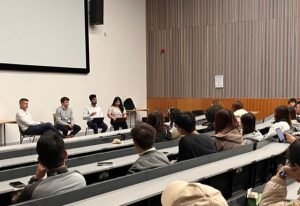 On Thursday November 17th, Bristol Talks Economics (in collaboration with the University of Bristol Business Society) was delighted to be joined by Kevin Wenzel, the Deputy Chief Financial Officer (CFO) for Allianz UK, a group of general insurance companies that includes LV= General Insurance.
On Thursday November 17th, Bristol Talks Economics (in collaboration with the University of Bristol Business Society) was delighted to be joined by Kevin Wenzel, the Deputy Chief Financial Officer (CFO) for Allianz UK, a group of general insurance companies that includes LV= General Insurance.
By Gus Harper
‘Bristol Talks Economics’ is a student-led society that organises talks from esteemed speakers for an undergraduate audience. The society aims to bring in a range of industry speakers to provide fresh insights into the world of economics and its intersection with research, finance, and journalism.
To start the event, Kevin provided insights into his time studying at Bristol University and how he started his career. I particularly enjoyed hearing about the changes and developments in the University since his time here, and about the lessons he took with him when launching his career.

The main focus of Kevin’s talk was his experiences as a CFO, and the values he believes are critical to managing the finances of a global corporation. With shifting global trade patterns, changing regulatory environments, and growing scrutiny from investors to take into account, Kevin referred to a model that Deloitte have developed. This outlines the four diverse and challenging roles he believes the CFO of the future will have to play.
Firstly, the CFO of the future must act as a steward. This encompasses the ‘typical’ roles of a CFO, as they ensure compliance with regulators, close the books correctly, and communicate any risk issues with the board.
Secondly, the CFO must act as an operator. Similar to the steward role, this encompasses financial planning and analysis, treasury, and other finance operations that are typically associated with a CFO.
Thirdly, Kevin highlighted the role of a strategist. This role differs greatly from the two aforementioned and is becoming increasingly important for CFOs as they help shape the overall direction of a company. I found this role particularly interesting, as Kevin highlighted his ability to shape the firm’s mergers and acquisitions and long-term investment strategy, and how it provides variability in his work.
Lastly, a CFO must act as a catalyst. They will impart a financial approach, mindset, or direction that helps certain parts of the organisation perform better. This could be through using their power to selectively drive performance or improvements in certain areas while adding value to the company and improving efficiency.
To end his talk, Kevin imparted some advice for students as they progress through University and start their professional life. He described how much his career and roles had changed over time – from that of Chief Actuary to CFO – and how the two most important traits for responding to change in work are adaptability and resilience.
I believe society events are incredibly valuable to students, as they provide the opportunity to hear from leading industry professionals about their line of work. It also allows us to hear about the practical applications of content learned at University, which I have found particularly interesting as an economics student myself.
Reflecting on the event, Kevin commented, ‘It was great to return to Bristol and see how much the University has progressed since I studied there. I really enjoyed the session and particularly the wide range of questions raised.’
Bristol Talks Economics has several events planned for the upcoming semester, including one with the Global Head of Research at Standard Chartered in collaboration with the Bristol Trading Society, so keep an eye out for any future talks.
Written by Gus Harper, a third year Undergraduate studying Economics (BSc) and a Seminar Director for Bristol Talks Economics. You can also follow Bristol Talks Economics on Instagram and Facebook.
For more information about the School of Economics, and starting your amazing story, visit our website.

